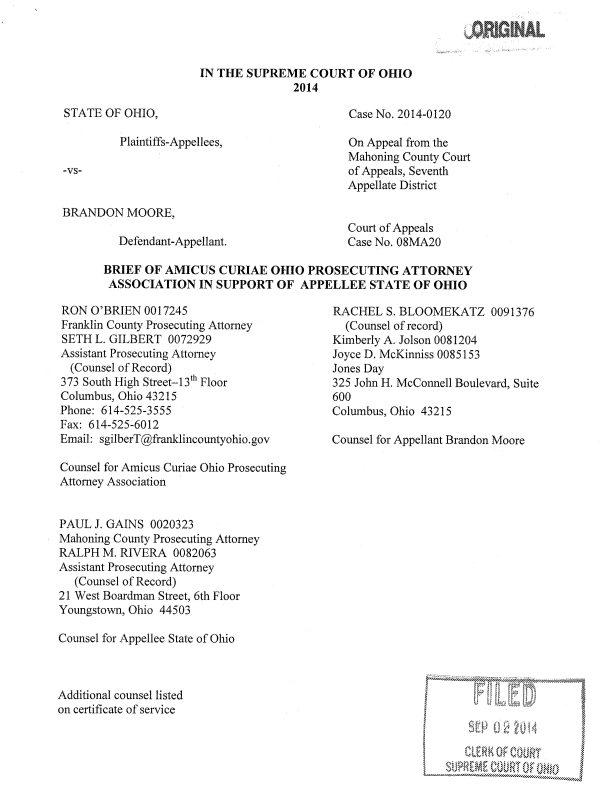
Summary of Argument
In Graham v. Florida, 560 U.S. 48 (2010), the United States Supreme Court held that the Eighth Amendment prohibits a trial court from sentencing a juvenile offender to life without parole for a single nonhomicide offense. Defendant Brandon Moore was not sentenced to life without parole for any nonhomicide offense. Instead, he was convicted of numerous offenses, and for each offense the trial court imposed a prison term of a specific length within the applicable statutory range and ordered that they be served consecutively, for a total of 112 years.
Yes, Moore's cumulative prison sentence is lengthy. And yes, he may die in prison (or maybe not-he will be eligible for judicial release when he is 92 years old, Appellee's Brief, 23, n. 2). But that is only because the sheer number of Moore's crimes justifies this punishment. It is hardly "cruel and unusual" to require an offender to serve a separate sentence for each crime he or she commits. Even with juveniles, the commission of more crimes justifies more punishment.
Moore and his amici, however, argue that his cumulative sentence is unconstitutionalunder Graham because it is the "functional equivalent" to a life sentence. But comparing a life- without-parole sentence for a single offense to a cumulative sentence for mu.ltiple offenses is not an apples-to-apples comparison. It is more like comparing a single apple to a bushel of them, and the Eighth Amendment does not allow such. apple-to-apples comparisons. As this Court heldin State v. Hairston, 118 Ohio St.3d 289, 2008-Ohio-2338, the focus under the Eighth Amendment is on the individual sentence for each offense, not the cumulative sentence formultiple offenses. Consistent with this offense-specific approach, Graham established a categorical rule that banned a specific type of sentence: Life without parole for a single nonhomicide offense. The distinction between life without parole for a single nonhomicide offense and a lengthy cumulative sentence for several narihomicide offenses is about much more than the label given to the sentence-it is about recognizing the difference between the sentence imposed for a single offense and the cumulative sentence imposed for multiple offenses.
Extending Graham to cumulative sentences for multiple offenses would not only run afoul of basic Eighth Amendment doctrine as expressed in Hairston, but it would also create an unworkable rule. Trial courts would have to become quasi-actuaries. Plus, neither Moore nor his amici offer any standards as to where the line would be separating a constitutional cumulative sentence from an unconstitutional one. And because life expectancy depends on any number of
factors, what counts as a permissible cumulative sentence will depend on the specific facts of each case, thus defeating the whole point of Graham's categorical rule. But perhaps most importantly, a cumulative-sentence approach would turn proportionality review upside down, because in certain cases the more crimes an offender commits, the less he or she can be punished on each offense.
The Court in Graham and other cases has exhaustively documented the differences between juvenile and adults. It is because of these differences that juveniles benefit from several categorical prohibitions on specific types of sentences. But proportionality under the Eighth Amendment cuts both ways: While the Eighth Amendment prohibits imposing a disproportionate sentence for any offense, it does not prohibit imposing a proportionate sentence for every offense.
Finally, there are jurisdictional and error-preservation issues lurking in this case that may justify dismissing it as improvidently granted. But if this Court does choose to address the merits of Moore's Eighth Amendment claim, the Seventh District should be affirmed.